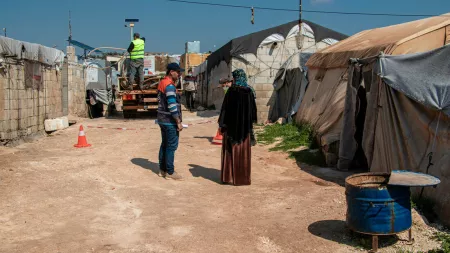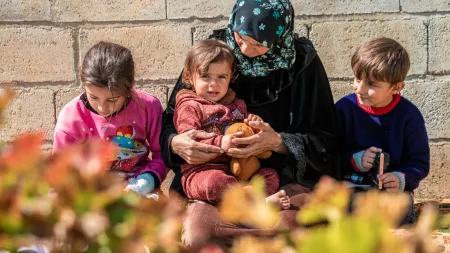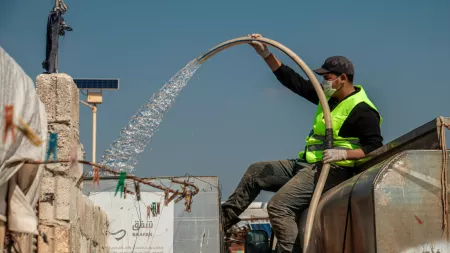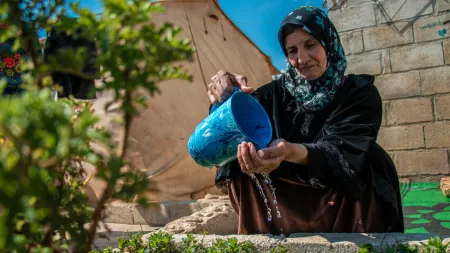Samira* has been standing in front of her tent in the camp in Northwest Syria for several minutes, waiting patiently. Finally, a truck pulls up along the bumpy road and stops right in front of the tent of her family. When three men get out of the truck and walk towards the 60- year-old woman, her face lights up. The truck is loaded with fresh, clean water. Three workers greet her amicably and lay a hose from the truck's tank into the tent, connecting it to a smaller tin tank.

Samira* and her family of 13 people had to leave their home five years ago because their village was repeatedly shelled. Since then, the family has been living in the camp in two tents, one next to the other. The tents offer no protection from the cold, heat or rain. And there is another problem: the lack of fresh and clean water.
The children constantly had skin diseases because we didn't have clean water to wash ourselves.Samira*
For a long time, Samira* had to walk to the town several kilometres away to get fresh water. This was not only exhausting but also she was never able to fetch enough water for the whole family. "The children constantly had skin diseases because we didn't have clean water to wash ourselves", explains Samira*. Some time ago, the family installed a tank in the tent with the help of Shafak, a local partner organisation of CARE. "The freshwater tank is very important to us. Our situation has improved significantly since then. I was even able to plant a small garden," she proudly shares as she walks behind the family's tent and presents the growing vegetables and flowers.

In the camp, water shortages are life-threatening as several risk factors come together. Not only do many people live together in a relatively small space, which favours the spread of infectious diseases, but the climate crisis is causing temperature to often rise above 40°C, which can quickly lead to circulatory problems and dehydration. Finally, the drought also means that no plants can grow, while many camp residents cannot afford food from the nearby city. As a result, displaced people are particularly affected by the lack of water since they cannot grow their own food.

CARE, with funding from the German Federal Foreign Office, recognising this challenge, is supporting the local partner organisation Shafak in implementing a water distribution project. Through this project, we supply water to 27 camps and five remote villages. But we do not stop there; we also educate people about hygiene measures and the proper use of water through training sessions.
I don't want to wait to be given something to eat from time to time. I want to go to work, lead a normal life and get my family out of this situation.Samira*
Nevertheless, not all challenges that Samira’s* family face have been solved. While a Shafak employee tests the water quality using a special device, Samira* points to the outdoor area next to her tent. In some places, there is no sewage system in the camp, which is why dirty water collects in certain areas. The old water stinks and is the ideal nesting place for mosquitoes, which can transmit diseases.
This is another reason why Samira* hopes that the family will be able to leave the camp soon. "I don't want to wait to be given something to eat from time to time. I want to go to work, lead a normal life and get my family out of this situation," she explains as she now starts washing up the dishes.
*Name changed to protect the respective identity.
